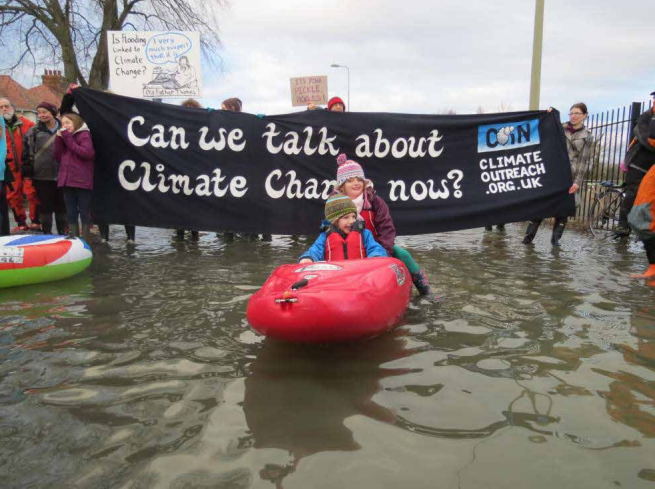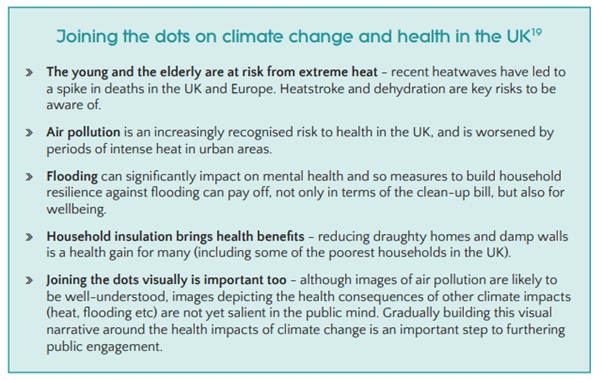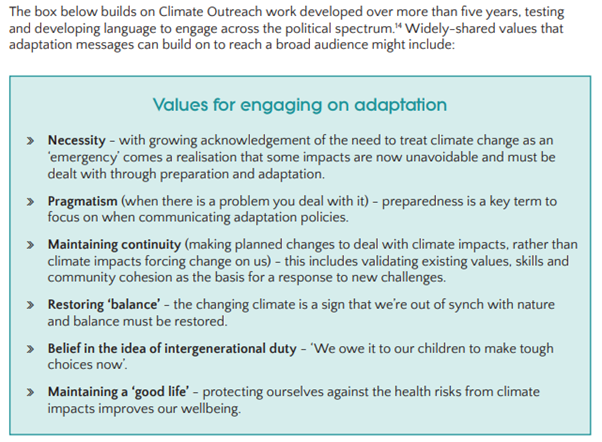Good news! It looks like this challenge is getting a bit easier. My hope arises from recent research by Climate Outreach, a UK charity (formerly called COIN) who specialise in communication strategies on climate issues.
Climate Outreach and Cardiff University commissioned a major public opinion study in late 2019, which has encouraging findings, and plenty of practical pointers for anyone seeking wider engagement on climate responses in their local community.
This study found high levels of climate concern, and also high support for practical measures on both adaptation and mitigation, across the political spectrum. Bear in mind that Britain was in the thick of Brexit when this research was done: given the extreme weather events here and globally in 2020-21, responses now would surely be even more positive.

Based on this report and earlier studies, Climate Outreach published a paper called Engaging the public on climate risks and adaptation. It’s readable and well presented: you can see and download it here. Some of the key findings are:
- Basic beliefs on climate change: concerns over climate have risen to an all-time high in the UK, as elsewhere, and 85% of respondents in this survey agreed that climate change is driven by human activity. Another key finding is that most people believe we’re already feeling the effects, it’s no longer something happening elsewhere or in the future.
- Adaptation initiatives: the need to adapt as well as mitigate seems widely understood, and support was 70-80% for a number of adaptation measures. The top priorities were:
- health and wellbeing of UK population, especially the vulnerable;
- smooth running of social and emergency services.
- Health impacts: the report advises highlighting the health risks from climate change, and health benefits from responses, as a good way to widen public engagement.
- Blind spots: the main climate threats most people were aware of and concerned about are floods, and increasingly, heat. Awareness was low for a range of other threats in the UK Climate Change Risk Assessments, including food shortages, biodiversity loss, water shortages and more. This leaves the issue of how to raise this awareness without overwhelming people.
- Community involvement: 62% in the study were confident their local community would act together in an emergency. The report advocates celebrating examples of successful practical action by local communities to build an upward spiral. It also comments that adaptation priorities are an issue well suited to citizen dialogue and similar processes, as they’re tangible steps which need collective support and action.
In the Appendix to this blog you’ll find three useful excerpts from the report:
- Advice on specific health issues related to climate change
- Shared values, such as balance and quality of life, which can engage more people
- A summary of the seven key findings.
There’s also a separate report, by Cardiff University with inputs from Climate Outreach, which contains more details of the findings from the opinion survey: it adds further useful info, for example on willingness to make personal lifestyle changes, and full lists of the adaptation and mitigation policies with priorities from respondents. You can see this report here.
The conclusions to the more detailed report include these encouraging comments: “We found greater emotional engagement (more fear, guilt and outrage than in 2016) and some evidence of a subtle shift in social norms … that inhibit people from taking action may well now be weakening.” My experience in my local food security project this year is that getting beyond the usual suspects still ain’t easy, but this research has encouraged me to keep trying, and with more insights into what may work.
APPENDIX
A

B

